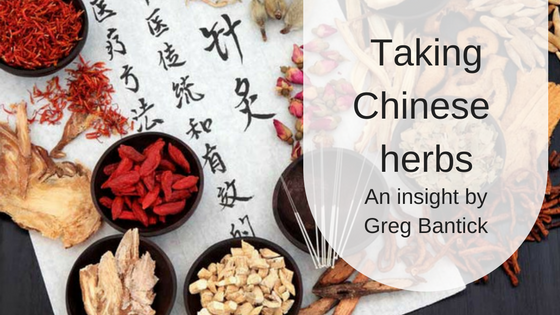
Taking Chinese Herbs - An insight by Greg Bantick
Published: November 29, 2016 Last Updated: January 21, 2024
People sometimes ask me if they can finish off those couple of bags from weeks ago? Generally speaking, it is best not to. The way we think about an appropriate prescription is to listen closely to and ask questions about the details of your symptoms, take your pulse, look at your tongue, maybe palpate or check the temperature of certain areas, review lab work and so on. From these, and our knowledge of an extensive range of formulas, their ingredients, actions and indications, a few formulas may stand out.
We often use these with modifications that are specific to your condition. Sometimes we continue for some time with a similar formula with minor modifications, particularly if we are working on an enduring condition. Sometimes we are changing the formula altogether or significantly as symptoms change, as your life conditions change, or the seasons change. Therefore herbs that were made up some time ago may even be inappropriate for you to take now. Ask if in doubt.
Some folks also find the taste and smell of Chinese herbs , strange, strong. I have heard some other interesting descriptions as well. This is very understandable to me. They are so new and different for many of us. We make them up with little consideration for the pleasantness of smell or taste, being concerned that we choose the best herbs to treat your condition. Many of them are very strong and are never used as foods in the way we use herbs like garlic, ginger, cinnamon as both medicine and food. Some of them need to be combined with others to minimise some potential side effects, mostly digestive upsets. A very few, have adverse interactions with certain medications and need to not be used when taking those medications. Or only used in combination with other herbs to counter those effects. In other words, they are potent and effective medicine. We use them to successfully treat some very serious conditions.
Benefits of Chinese herbs
Much of the benefit of the herbs is in the taste and smell. Unlike the more familiar western use of herbs and pharmaceutical medications which are compounded according to their biochemical components, Chinese herbs act via tastes and temperatures. Many of us are familiar with wasabi the horseradish that accompanies sushi and with ginger. Both of these are spicy warm. How is that determined, because this is the felt response from putting them in our mouths and swallowing them. While both are spicy, warm, the wasabi clearly goes to our nose, making it run, and penetrating through our sinuses. The ginger we feel warm our mouth and all the way down to our stomach. So these tastes and temperatures initiate different regions and different functions in the body. The spicy or aromatic taste disperses, so in the nose it helps relieve congestion. In the stomach, it helps promote digestion, invigorate transit time and move food stasis. So taking herbs without the wonderful experience of their tastes, diminishes their effectiveness.
Having confidence in their effectiveness
In spite of recognising them as strong medicines, sometimes the smell or taste is very strong and difficult to tolerate. A couple of other factors may be at play here. When we have confidence in something and are clear that it is helpful to us, we are willing to put up with inconvenience and discomfort. Exercise, a trip to the dentist, looking at difficult impasses in therapy, a firm massage, surgery or strong drug therapy can all be distinctly uncomfortable. We tolerate them because we know something of the benefits to come. We may not have the same confidence in Chinese herbs. Knowledge of why they have been prescribed and some experience of how useful they can be takes time to know. Please ask questions. Together we can find solutions that are effective and within what you can tolerate.

